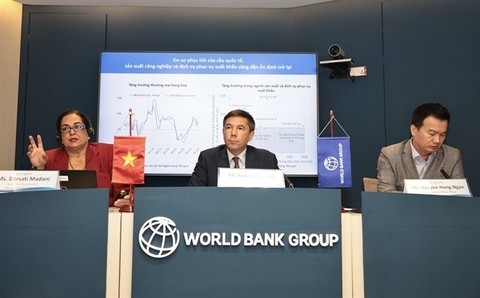World Bank forecast that VN’s economy will expand by 6.1 per cent in 2024
World Bank forecast that VN’s economy will expand by 6.1 per cent in 2024
Việt Nam’s economic growth is expected to pick up in 2024, driven by a rebound in manufactured exports and tourism and recovering consumption and business investment, the World Bank said on Monday in a new report.

The Vietnamese economy is forecast to grow 6.1 per cent in 2024 and 6.5 per cent in both 2025 and 2026, up from 5 per cent last year. — VNA/VNS Photo Trần Việt |
The Vietnamese economy is forecast to grow 6.1 per cent in 2024 and 6.5 per cent in both 2025 and 2026, up from 5 per cent last year, according to the bank’s latest Talking Stock report.
However the report, 'Reaching New Heights in Capital Markets' notes that the Vietnamese economy is not yet back to its pre-pandemic growth path.
Bank asset quality remains a concern given rising non-performing loans (NPLs) and should be closely monitored.
“During the first half of the year, Việt Nam’s economy benefitted from the rebound in export demand," said World Bank East Asia and Pacific Practice Manager for Macroeconomics, Trade and Investment Sebastian Eckardt in the press release.
“To sustain growth momentum not only for the rest of the year but over the medium term, the authorities should deepen structural reforms, step up public investment while carefully managing emerging financial risks.”
According to Dorsati Madani, Senior Country Economist at the World Bank in Việt Nam, the country's economic prospects are positive with broadly balanced risks.
She pointed out that there are downside risks stemming from slower-than-expected global growth, particularly among major trading partners such as the US, EU and China.
Domestically, a weakening of macro-economic stability could erode consumer confidence and impact consumption and investment.
The real estate market recovery could take longer than expected, adversely impacting private sector investment.
In addition, if the financial sector’s asset quality were to weaken further, bank lending capacity could be undermined.
Increasingly intensifying climate-related natural disasters could pose additional downside risks.
Meanwhile, more accommodative monetary policy in major advanced economies could further support their demand and boost Việt Nam’s exports.
She said the focus should be on speeding up the disbursement of public investment to promote economic growth.
In the financial and banking sector, banks must improve their capital adequacy ratio while the reform of the capital markets must be accelerated, she added.
The report finds that the development of capital markets would provide a vital source of long-term funding for Việt Nam’s economy and help the country achieve its goal of becoming a high-income nation by 2045.
With regard to structural reform, she said that it is necessary to improve the legal framework for sectors such as information, technology and communications, power and transport to improve the infrastructure for future development.
Efforts are needed to accelerate international integration and participate deeply into the global value chain together with upscaling labour market.
Capital markets
Việt Nam’s capital markets have developed strongly over the past decade, underpinned by robust macro-economic conditions but remained nascent, the World Bank’s Senior Financial Sector Specialist, Ketut Kusuma, said.
Healthy economic growth, a stable exchange rate, low inflation and political stability have positioned Việt Nam’s capital markets to catch up with regional peers in term of their relative size, reaching above 90 per cent of GDP in 2023.
“Well functioning capital markets are critical to mobilise resources as part of inclusive, resilient and modern financial markets,” he said.
Despite large market capitalisation, fundraising is limited especially in the stock market, only VNĐ37 trillion (US$1.5 billion) per year in two stock exchanges in 2019-23, he said, adding that most listings are more of an 'introduction to trade' not with IPO or fundraising.
Bonds are relatively more significant with about VNĐ271 trillion of Government bonds and VNĐ403 trillion of corporate bonds issued annually. However, corporate bonds’ recent jump has come with a risk.
The total amount of savings mobilised through institutional investors is still low, only 19 per cent of GDP, smaller than most of regional peers, limiting the amount available for long-term investments. Meanwhile, regarding pricing, capital markets have not provided strong price reference due to unclear short-term interest benchmark, inefficiencies in the Government bond market and high volatility in stock prices.
A fundamental issue in Việt Nam which needs to be overcome to ensure healthy and sustainable growth is the underdevelopment of the institutional investor base, including the underutilisation of the Việt Nam Social Security Fund (VSS).
Ketut stressed that VSS could be a potentially dominant force in driving capital market development. The absence of a large weight of institutional investors in the corporate securities markets also allows individual investors to control, which can create volatility from herd behavior as well as the accumulation of risks within the corporate bond market.
Besides, policies that would allow markets to reclassify Việt Nam from 'frontier market' status to 'emerging market' status are critical to help attract more foreign investors together with reforms to enhance market transparency and investors protection.
Effective coordination among financial regulators is crucial for achieving these goals.
“Billions of dollars of global investment funds will flow into the capital markets if Việt Nam is upgraded to the emerging market status,” Ketut said.
“At the same time, gradual diversification of VSS investment is key not only to improve its long-term investment returns but also to fuel Việt Nam’s economic growth through investments in the corporate sector,” he added.
“A concerted effort to develop the capital markets should be a key objective of the Government,” Ketut stressed.
"Việt Nam will be able to achieve a higher economic growth, not only because domestic resources are used more productively but also because it is leveraged with much-needed capital from the international market to achieve its ambitious high-income goal."



























